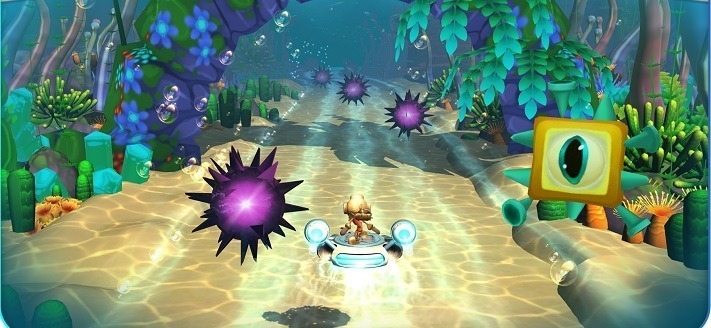Update: Repetitive negative thinking may increase (or perhaps be caused by) Alzheimer’s pathology
 Time for a new edition of SharpBrains’ e‑newsletter, featuring this month 13 research findings, resources and brain teasers for lifelong brain and mental health.
Time for a new edition of SharpBrains’ e‑newsletter, featuring this month 13 research findings, resources and brain teasers for lifelong brain and mental health.
#1. “We found that people who exhibited higher repetitive negative thinking patterns experienced more cognitive decline over a four-year period. They also had specific declines in memory (which is an early sign of Alzheimer’s disease), and had more amyloid and tau deposits in their brain … There’s increasing evidence that chronic stress is both harmful to your body – and your brain. But more research is needed to understand this link.” Repetitive negative thinking may increase (or perhaps be caused by) cognitive decline and Alzheimer’s pathology
#2. “…even simple cognitive processes like making a shopping list now require more brainpower. “Now, rather than thinking, ‘I’ll just run to the store’, you’re thinking about what you need, what stores are open and whether it’ll be safe to go there. Let’s say your brain can do four tasks at once. Now all of a sudden there are 10, and you can’t do any of them” … rebooting your working memory may also mean cutting down on your news consumption and considering a break from social media. But the most effective thing to do might simply be to convince yourself it’s OK to be struggling.” Why stress regulation and working memory are core building blocks of lifelong resilience
#3. Ten years from now, will we see DSM‑6 or Something Much Better (SMB)-1? The way we approach Mental Health today is broken beyond repair. The question is, what comes next, and how fast can we get there?
 #4. Now, please draw the letter J in your mind. Then, draw the letter D. Turn it 90 degrees to the left and put it in top of the J. What does this shape resemble? Enjoy these three quick brain teasers to exercise your working memory
#4. Now, please draw the letter J in your mind. Then, draw the letter D. Turn it 90 degrees to the left and put it in top of the J. What does this shape resemble? Enjoy these three quick brain teasers to exercise your working memory
#5. “Reading science fiction and fantasy can help readers make sense of the world. Rather than limiting readers’ capacity to deal with reality, exposure to outside-the-box creative stories may expand their ability to engage reality based on science … With increasing rates of anxiety, depression, and mental health issues for youth in the past two decades, it may be the case that young people, no different from American society generally, are suffering from reality overload.” — Esther L. Jones, Ph.D Reading science fiction can help children build critical thinking and resilience
#6. “For decades, use of biofeedback to help sufferers of anxiety, among other psychological conditions, has largely been limited to clinical settings with expensive—and somewhat tedious—medical equipment. Now, with an assist from developers of virtual-reality games, effective therapeutic biofeedback is becoming more affordable, accessible and engaging.” Virtual-reality gaming + affordable biofeedback = Anxiety therapy for all?
 #7. Now comes the real challenge: getting doctors to prescribe it, insurers to pay for it, kids to use it and hopefully see significant improvements in daily life. FDA clears first videogame to be prescribed to kids with ADHD: EndeavorRx by Akili Interactive Labs
#7. Now comes the real challenge: getting doctors to prescribe it, insurers to pay for it, kids to use it and hopefully see significant improvements in daily life. FDA clears first videogame to be prescribed to kids with ADHD: EndeavorRx by Akili Interactive Labs
#8. Hope you enjoy this overview by Dr. Ricardo Gil-da-Costa at Neuroverse and our very own Alvaro Fernandez: Explore The State of Noninvasive Neurotechnology in 37 minutes and 1 image
#9. Here with neuroscientist Mara Dierssen, in Spanish: Cómo minimizar el impacto del Covid-19 en nuestro cerebro
#10. Ignoring problems doesn’t typically solve them — good to see serious attempts to understand, detect and address chemo brain. Growing research shows how two of the major cancer treatments, radiation and chemotherapy, can lead to long-term cognitive impairment
#11. “… COVID-19 may lead to anywhere from 27,644 to 154,037 additional U.S. deaths of despair, as mass unemployment, social isolation, depression and anxiety drive increases in suicides and drug overdoses.” Time to reimagine brain & mind care: Four immediate priorities to flatten the mental distress curve
#12. Moving beyond Either/ Or Thinking: Antidepressant vortioxetine combined with cognitive training may help delay cognitive decline
 #13. Not the worst week to leave Earth, but still plenty of mental health challenges in space. Request for proposals to help astronauts combat behavioral health challenges such as stress and isolation
#13. Not the worst week to leave Earth, but still plenty of mental health challenges in space. Request for proposals to help astronauts combat behavioral health challenges such as stress and isolation
Have a good and safe summer,
The SharpBrains Team


